Our AI UK 2024 Top Picks

Team member - Adam Keeley, DAT Manager
Top pick - Data, Labour and AI
Speakers - Karen Gregory (University of Edinburgh), Mophat Okinyi (African Content Moderators Union ACMU), Matt Buckley (United Tech and Allied Workers) and Billy Perrigo (TIME)
 "This session highlighted a dark side to AI that I'd previously not considered. We've all heard about the environmental concerns surrounding the server farms and the enshittification of the internet from LLM hallucinations but this session talked to the deliberately obfuscated outsourcing of psychologically scarring tasks to developing nations. I'd never given much thought to the poor souls who are tasked with 'detoxifying' training material and was ignorant to the exploitation happening in that space.
"This session highlighted a dark side to AI that I'd previously not considered. We've all heard about the environmental concerns surrounding the server farms and the enshittification of the internet from LLM hallucinations but this session talked to the deliberately obfuscated outsourcing of psychologically scarring tasks to developing nations. I'd never given much thought to the poor souls who are tasked with 'detoxifying' training material and was ignorant to the exploitation happening in that space.
"Honourable mention to the ‘Monitoring of biodiversity with AI’ stand. I thought it was a great use of AI to identify and monitor key indicator insect species as they were attracted to UV lamps placed across the country. They’ve even identified new species across the world using the technology at a scale that wouldn’t otherwise be possible. All running on a Raspberry PI!"
Team member - Andrea Rylands, IT Governance Manager
Top pick - The New Real - Opening Provocation: Artistic and Queer Visions of AI Futures
Speakers - Me the Drag Queen (Drag Artist & Producer), Jake Elwes (Artist), Maribeth Rauh (Research Engineer, Google DeepMind), Constant Dullart (Artist & Professor), Danielle Brathwaite-Shirley (Artist), Hugo "The PUF" Crick-Furman (Drag Omen & Apocalypse Puppeteer), Sougwen Chung (Founder, SCILICET)
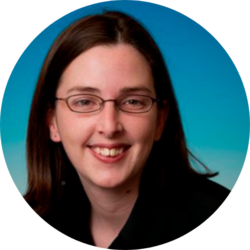 "The whole AI UK event was engaging so I've found it hard to pick one! But if I had to, it would be 'The New Real - Opening Provocation: Artistic and Queer Visions of AI Futures'. It was a captivating exploration of AI’s potential beyond mere optimization.
"The whole AI UK event was engaging so I've found it hard to pick one! But if I had to, it would be 'The New Real - Opening Provocation: Artistic and Queer Visions of AI Futures'. It was a captivating exploration of AI’s potential beyond mere optimization.
The session presented a hopeful apocalypse filled with existential joy. It showcased transformative artwork that celebrates AI’s astonishing capabilities and responsibly illustrates its potential. The artwork explored alternate futures, messy and queer utopias, and hopeful apocalypses. The session illuminated how emerging technology can become a creative, playful, and deeply impactful part of everyday living and learning. I found it to be a truly profound demonstration of AI’s fascinating and unanticipated interactions with life. A really enlightening experience."
Team member - Ifeanyi Chukwu, Research Software Technician
Top pick - The Secret Sessions
Speakers - Tim Watson (Defence & Security, The Alan Turing Institute) and Steven Meers (UK Ministry of Defence)
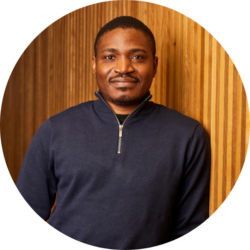 "It is difficult to single out a favourite session, given that I enjoyed all the sessions. However, I’d like to highlight the session with Steven Meers from the Ministry of Defence. He outlined the ethical development of intelligent tools supporting service personnel. It was intriguing that the primary goal of the AI tools they’re developing is to foster peace locally and globally. While he did not outline specifics AI projects, due to security and privacy concern, the fireside chat offered a comprehensive view of how AI in military is maximizing personnel safety and emphasized the rigorous ethical considerations inherent in AI development for defence purposes. This was reassuring to note.
"It is difficult to single out a favourite session, given that I enjoyed all the sessions. However, I’d like to highlight the session with Steven Meers from the Ministry of Defence. He outlined the ethical development of intelligent tools supporting service personnel. It was intriguing that the primary goal of the AI tools they’re developing is to foster peace locally and globally. While he did not outline specifics AI projects, due to security and privacy concern, the fireside chat offered a comprehensive view of how AI in military is maximizing personnel safety and emphasized the rigorous ethical considerations inherent in AI development for defence purposes. This was reassuring to note.
"Equally engaging was the Imagine Futures session, where speakers envisioned AI's transformative role in the next decade, as well as three and eight decades ahead. The outlook presented varied from a potentially grim scenario of AI promises falling short, leading to an AI winter, to an optimistic future where AI drastically improves the world. This dual perspective underscores the complexity and potential consequences of AI advancement, leaving room for both concern and excitement about its future implications."
Team member - Fojan Ilderem, Research Software Technician
Top pick - Improving Disease Detection
Speakers - Pearse Keane (Moorfields Eye Hospital), Cathie Sudlow (HDR UK), Antonis Antoniou (University of Cambridge), Lucy Chappell (Department of Health & Social Care) and Doug Gurr (The Alan Turing Institute)
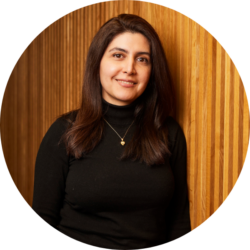 "The discussion on the applications of AI in transforming early disease detection and improving patient outcomes was fascinating. It was incredible to learn how AI is already enhancing cancer diagnosis, reducing referrals, and has the potential to alleviate monotonous, laborious tasks, thereby freeing up practitioners' valuable time for more critical tasks. Prof. Antonis Antoniou's reference to a study showing that loyalty card data could help identify ovarian cancer symptoms sooner was an unexpected and remarkable discovery.
"The discussion on the applications of AI in transforming early disease detection and improving patient outcomes was fascinating. It was incredible to learn how AI is already enhancing cancer diagnosis, reducing referrals, and has the potential to alleviate monotonous, laborious tasks, thereby freeing up practitioners' valuable time for more critical tasks. Prof. Antonis Antoniou's reference to a study showing that loyalty card data could help identify ovarian cancer symptoms sooner was an unexpected and remarkable discovery.
"Despite AI's great promise for a better and more equitable healthcare system, I found Prof. Pearse Keane's insights into the challenges of widespread AI adoption in healthcare particularly enlightening. Prof. Keane drew an analogy to the advent of electricity in the 1870s, where engineers were experimenting with innovative prototypes of lightbulbs without the necessary infrastructure, such as power plants and distribution networks. Similarly, we are currently developing innovative AI prototypes for healthcare without the ecosystem needed for broader adoption. The business model for AI in healthcare is not straightforward, and despite the general belief in the abundance of data, there is evidence suggesting we may be facing health data poverty due to opt-in consent mechanisms. Additionally, the potential for using data from wearable devices and linking it with patients' health records presents another promising avenue for faster diagnostics. This session underscored the transformative potential of AI in healthcare, illuminating the path forward with optimism and caution alike."
Team member - Chris Andrew, Research Software Engineer
Top pick - The Camden Council Case Study
Speakers - Tariq Khan (London Borough of Camden), Beata Karolina Lisowska (Camden Council), Saba Esnaashari (The Alan Turing Institute), Lasana Harris (UCL) and Timandra Harkness (Writer, Presenter, Comedian)
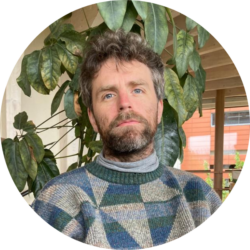 "I was properly inspired by this discussion with the data leaders and researchers of Camden Council, not because they were using or talking about some shiny new AI tools (though there was a bit of that) but because they are taking a very careful and considered approach to actually make peoples lives better in that area. They're using AI in combination with the rich and varied datasets that the council are custodians of to help predict and prevent individuals falling into homelessness, reduce the worst outcomes of domestic violence, and more efficiently target the services the council provides, among other things.
"I was properly inspired by this discussion with the data leaders and researchers of Camden Council, not because they were using or talking about some shiny new AI tools (though there was a bit of that) but because they are taking a very careful and considered approach to actually make peoples lives better in that area. They're using AI in combination with the rich and varied datasets that the council are custodians of to help predict and prevent individuals falling into homelessness, reduce the worst outcomes of domestic violence, and more efficiently target the services the council provides, among other things.
This began with meaningful consultation with the people of Camden to help them understand what and why they were using their data in the myriad ways through creating the Camden Data Charter, to build citizen trust with the council, which is improving lives in it’s own right.
Rather than following the old tech adage of “Move fast and break things” a phrase that kept coming up in this context was “Move slow and fix things” which is a refreshing thing to hear in the current AI landscape. Hats off to Camden."
Team member - Jodi Gunning, Research & Innovation
Top pick - AI and Public Sector Productivity
Speakers - Youmna Hashem (The Alan Turing Institute), Jonathan Bright (The Alan Turing Institute) and Timandra Harkness (Writer, Presenter, Comedian)
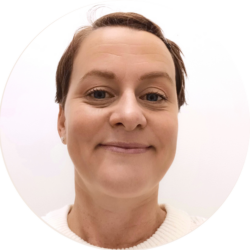 "This session presented work by the Turing about the potential for AI to improve public sector productivity. They had done an impressive piece of work mapping the number of functions the central governments operates that citizens interact with. It showed that there is a huge range of contact points and that these are currently not joined up. It also showed how much time is spent in bureaucratic tasks which could be automated and how much duplication of tasks occurs. It also showed the extent to which workers in government departments are already adopting AI to streamline their workloads.
"This session presented work by the Turing about the potential for AI to improve public sector productivity. They had done an impressive piece of work mapping the number of functions the central governments operates that citizens interact with. It showed that there is a huge range of contact points and that these are currently not joined up. It also showed how much time is spent in bureaucratic tasks which could be automated and how much duplication of tasks occurs. It also showed the extent to which workers in government departments are already adopting AI to streamline their workloads.
As we might expect, a challenge came from the audience around the protection of public sector jobs. The response from the representative from Turing was that their research showed the potential in AI did not support fewer staff in the public sector, but rather could enable those staff, firstly to reduce the amount of unpaid overtime they currently work, but also to free up time for them to focus on the human contact aspects of their roles which are currently squeezed by admin tasks."
Team member - Kim Wright, Business Co-ordinator
Top pick - Pitchfest
Judges - Maria Delgado Ortet (University of Cambridge), Mark Girolami (The Alan Turing Institute) and Trias Gkikopoulos (Innovate UK)
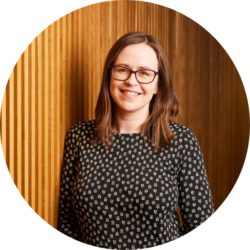 "I particularly enjoyed the Pitchefest session on the second day, which was a Dragon's Den-type event where researchers had 90 seconds each to pitch their research to the audience and panel of judges, which could have real-world application. We were treated to some truly innovative research, with a touch of theatre! "what's in the box?!" drawing a few laughs from the film buffs in the audience. Very engaging.
"I particularly enjoyed the Pitchefest session on the second day, which was a Dragon's Den-type event where researchers had 90 seconds each to pitch their research to the audience and panel of judges, which could have real-world application. We were treated to some truly innovative research, with a touch of theatre! "what's in the box?!" drawing a few laughs from the film buffs in the audience. Very engaging.
It was also great to meet with the Skills Team, we had a long chat about our Data Scientist Development Programme and school outreach programme, and finding out about another exciting internship opportunity aimed at undergraduate students. Putting faces to names is always wonderful, in particular Harriet McCann who I have been emailing on and off for almost 6 years in various capacities. Finally, it was great to speak to the Academic Engagement Team and a fellow Turing University Liaison from the University of York, we'll be in contact to help share best practice on how we can support Turing activity in our respective Universities."
Team member - Hannah Jackson, Communications Manager
Top pick - Talking to Machines - Deep Fakes, Vulnerabilities, Robotics & Edge AI
Demo hosts - Defence AI Centre (DAIC), Defence Science and Technology Laboratory (DSTL)
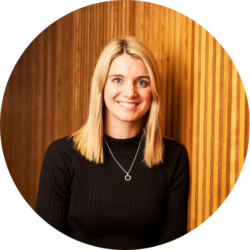 "I really enjoyed the deep fake demo from the Defence AI Centre. They had a talking head on screen that would repeat your own words back to you. Sounds simple enough right? The extra layer on top of this, was that it would also facially emulate the tone of voice with which you delivered your words.
"I really enjoyed the deep fake demo from the Defence AI Centre. They had a talking head on screen that would repeat your own words back to you. Sounds simple enough right? The extra layer on top of this, was that it would also facially emulate the tone of voice with which you delivered your words.
So, if you said something in a marginally happy voice the face would have a slight, but realistic smile while speaking. If you used a stern or unhappy voice, it would adopt a frown with even minor changes to the mouth shape. It could detect and convincingly replicate all of this emotion, in a matter of seconds, purely via sound. There was no camera to capture your face, only a microphone to speak into.
We’re all very familiar now with the rising threat of deep fakes, from malicious phone calls pretending to be family members in need of help, to world-famous celebrities making bizarre video announcements online, to politics and warfare interference. With public trust waning everyday with what’s real and what’s not, particularly on social media, it’ll be interesting to see how the media and public relations teams evolve to handle this threat."
